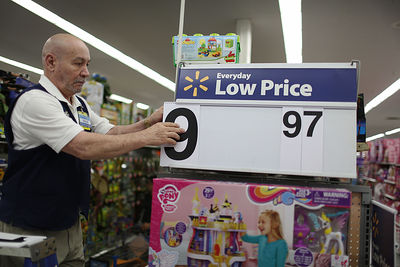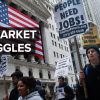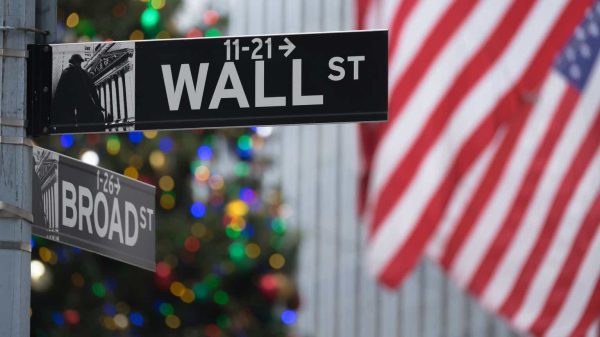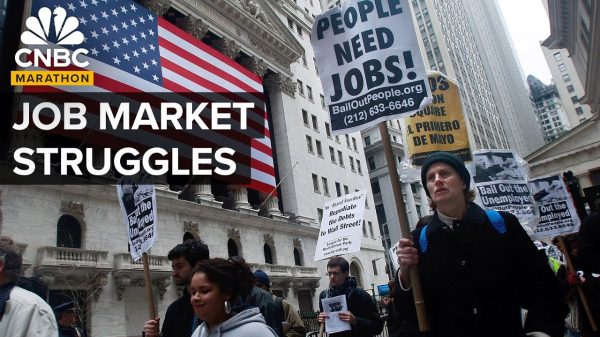As we settle in for the holiday with our turkey and pumpkin pie next week, investors have plenty to be thankful for this year.
This time last year, stocks were still in the gutter, inflation was in the stratosphere and Federal Reserve interest rates were going up, up, up.
This time it’s different. The S&P 500 has risen 17% since Jan. 1. The much-anticipated recession has yet to arrive. Unemployment remains below 4% even after the most aggressive campaign of interest-rate increases in a generation. And consumers are still spending–Walmart, Target, and Gap all beat expectations this week.
It helps that the inflation rate has dropped back substantially to around 3%, not too far off the Fed’s 2% target. Walmart CEO Doug McMillon was even talking about deflation in the coming months.
Oil prices are below $75 a barrel, which should take the edge off the cost of gasoline. Airfares are also significantly cheaper this year than they were for the holidays last year, according to price-tracking website Hopper.
After the latest inflation data, bond yields are dropping, too, as traders start to price in Fed rate cuts next year. The 10-year yield, which has been the bane of stocks as the Fed promised to keep rates higher for longer, has dropped back to around 4.4% from as high as 5% in October.
And while the tension between the U.S. and China is an obstacle to global growth, it was positive to hear Chinese leader Xi Jinping say this week that he wants the two countries to be friends.
Of course, lots of these things could be interpreted as signs the recession may finally be coming. But for now, it’s good to be grateful for what we have.
—Brian Swint
*** Join Investor’s Business Daily’s multimedia content editor Alissa Coram and deputy markets editor David Saito-Chung today at noon when they detail how investors can generate outperformance without having to buy and sell stocks a lot. They will talk about how to find these seemingly elusive trades and how to determine which stocks are the ones that deserve your patience. Sign up here.
***
Retail Earnings Give Mixed Picture of Spending as Holidays Approach
Another batch of earnings reports from retailers on Thursday gave a mixed picture of consumer spending and industry projections entering the holiday sales season.
Gap
beat expectations, including a smaller-than-estimated drop in third-quarter same-store sales under new CEO Richard Dickson.
- Gap’s same-store sales fell 2% from last year, better than the 8.7% drop expected. Net sales in this year’s fourth quarter are expected to be flat to slightly negative compared with last year, which included $90 million in sales from Gap China, which the retailer has since sold.
-
Macy’s
also reported better-than-expected third-quarter sales and earnings but adjusted its full-year outlook to reflect an uncertain economic environment. CEO Tony Spring said Macy’s was entering the holiday period “in a healthy inventory position,” with merchandise inventory 6% lower than last year. -
Walmart
also beat expectations on revenue and comparable sales and raised its Wall Street estimates. But a 4.7% rise in same-store sales was less than last year’s figure. It forecast adjusted earnings per share for full year 2024 of $6.40 to $6.48 a share, slightly below expectations. -
Bath & Body Works
beat earnings and sales estimates, but its guidance disappointed. The soap-and-fragrance retailer expects fourth-quarter net sales and earnings to decline more than expected. It also lowered its full-year net sales and earnings guidance.
What’s Next:
Williams-Sonoma
beat profit analysts’ expectations but missed on revenue and same-stores sales. The home goods and furniture retailer cut its full-year outlook, expecting revenue to drop 10% to 12% as consumers continue to hesitate spending on high-ticket furniture.
—Janet H. Cho
***
Oil Headed for Fourth Straight Week of Declines
Oil prices were on pace for a fourth consecutive week of declines on Friday as demand worries continued to weigh on the market.
- Oil futures had settled at their lowest level since early July on Thursday, hit by a report showing a decline in U.S. industrial production in October. West Texas Intermediate futures settled at $72.90 a barrel, while Brent crude futures, the international benchmark, reached $77.42 a barrel. Prices were edging up on Friday.
- That saw prices approach a pattern known as contango, in which spot prices and near-term futures are worth less than futures expiring several months from now, indicating a well-supplied market. A weakening demand outlook caught out speculators who had large long positions on oil, according to Ole Hansen, head of commodity strategy at Saxo Bank.
- The drop could prove to be short-lived according to the majority of forecasts, which call for a rebound in 2024 on stronger demand and potential supply cuts. UBS Global Wealth Management forecasts Brent crude to trade in the $90 to $100 a barrel range.
What’s Next: The Organization of the Petroleum Exporting Countries and its allies are meeting on Nov. 26. Analysts at UBS said they expect Saudi Arabia and Russia to extend their voluntary output cuts into 2024 but additional cuts can’t be ruled out.
—Adam Clark
***
U.S.-China Relations Trip Up Alibaba’s Cloud Spin Off Plan
U.S.-China relations, in the spotlight during this week’s meeting of Presidents Joe Biden and Xi Jinping, is pressuring Chinese technology companies. Hangzhou-based e-commerce company
Alibaba
has canceled the planned spinoff of its cloud computing arm, underscoring that risk.
- The Alibaba business houses its efforts in artificial intelligence. The company cited the risk of recently-expanded U.S. export controls on advanced computer chips. The spinoff had been part of a broader plan to break into six parts and list most of them publicly.
- Alibaba also said it put on ice plans to list its grocery business, Freshippo. China’s economic slowdown this year has slammed the country’s capital markets. Alibaba has so far only filed for an IPO of its Cainiao logistics business, which would be listed in Hong Kong.
- After the U.S. tightened rules for the export of sophisticated chip technology to China, the biggest Chinese tech companies have become a flashpoint of bilateral tensions. The U.S. cited national security concerns for restrictions. The Biden-Xi meeting attempted to thaw tense relations.
-
Tencent Holdings,
a Chinese social-media and videogame firm said the U.S. chip curbs would affect its business leasing AI chips through cloud services. It has stockpiled chips, including one by
Nvidia,
The Wall Street Journal reported.
What’s Next: Alibaba said the U.S. chip restrictions may affect its business more generally by hindering its ability to upgrade tech capabilities. U.S. rules are encouraging China’s tech sector to speed research to advance artificial intelligence without relying on the latest American chips, the Journal reported.
—Liz Moyer and Jack Denton
***
Amazon.com Adds New Car Sales Starting With Hyundai
Amazon.com
is adding a new category to its e-commerce store: cars. Starting next year, shoppers will be able to buy a new vehicle through its store from a dealer near them, with
Hyundai Motor
being the first to sell on the platform. It’s another step in the direct consumer sales model developed by
Tesla.
- Amazon and Hyundai announced their multiyear deal at the Los Angeles Auto Show. Shoppers can search for new car options in their area, buy it through Amazon using their preferred payment and financing options, and pick it up or have it delivered by the local dealer.
- Hyundai cars will come equipped with Amazon’s Alexa voice assistant starting in 2025. Until now, shoppers could browse options at local new car dealerships through Amazon’s digital showroom but could not purchase directly through the site.
-
Consumers have become more open to buying cars online, after auto dealers expanded their online showrooms and home-delivery services during pandemic lockdowns. After Tesla introduced direct-to-consumer auto sales, rivals
Rivian
and
Lucid
followed suit. - Electric vehicle buyers were more open than those buying gas-powered vehicles to buying cars fully online in 2022, Cox Automotive research said. EV buyers, on average younger and more tech-savvy, prefer online buying because it saves time and is more convenient, Cox said.
What’s Next: Other auto makers who sell gas-powered vehicles through a traditional dealer network are also looking at ways to digitize sales.
Ford Motor
plans to offer EV shoppers more flexible online buying next year, including remote vehicle delivery, The Wall Street Journal reported.
—Janet H. Cho
***
Starbucks Workers Walk Out on ‘Red Cup’ Giveaway Day
In the latest labor movement activity, thousands of unionized
Starbucks
workers went on strike Thursday, coinciding with the coffee chain’s annual “Red Cup Day” giveaway for the second-straight year. Starbucks Workers United wants the company to come to the table on pay raises, increased staffing, and other issues.
- A union representative said about 5,000 workers were expected to participate in the walkouts, its biggest action to date, The Wall Street Journal reported. The company estimated a few dozen stores were affected but said many stayed open.
- About 360 Starbucks stores have unionized with Workers United since December 2021. That number is a fraction of the more than 9,000 company-operated locations in the U.S. The union and Starbucks have accused each other of dragging out negotiations to reach initial contracts.
- Starbucks said in a statement: “We remain committed to working with all partners, side-by-side, to elevate the everyday, and we hope that Workers United’s priorities will shift to include the shared success of our partners and negotiating contracts for those they represent.”
-
United Auto Workers members showed support for the Starbucks workers in posts on social media. The walkout came the same day unionized auto workers at
General Motors
ratified a new contract, and workers at Ford Motor and
Stellantis
appeared to be close to approval.
What’s Next: Starbucks recently announced plans to spend $1 billion on workforce initiatives, the second round of investment since unionization activity began two years ago. It plans to double hourly incomes by 2025 compared with 2020 levels through more hours and higher pay.
—Sabrina Escobar, Catherine Dunn, and Liz Moyer
***
Do you remember this week’s news? Take our quiz below to test your knowledge. Tell us how you did in an email to [email protected].
1. The October consumer price index bolstered the argument that the Federal Reserve could be near the end of its interest rate increases, coming in cooler than expected from last year and below September’s pace. What was the annual increase?
a. 3.0%
b. 3.2%
c. 3.4%
d. 3.6%
2. United Auto Workers members at which of the following Big 3 auto makers have ratified their new labor contract as of Thursday, though the margin of victory had some worried it might fail?
a. General Motors
b. Ford Motor
c. Stellantis
d. Tesla
3.
Walt Disney’s
The Marvels was a flop during its opening weekend, bringing in just $47 million in domestic box office sales, far below initial projections and the worst opening showing for a Marvel Cinematic Universe movie. How many have there been in the series?
a. 14
b. 25
c. 33
d. 39
4. Wall Street bonus season is quickly approaching, but compensation consulting firm Johnson Associates sees a somber mood ahead, with overall incentive pay set to be flat to down in many areas. Which of the following business lines is expected to have the biggest drop in bonuses?
a. Equity underwriting
b. Investment banking advisory
c. Wealth management
d. Hedge funds
5. Thanksgiving travel week is about to hit. The AAA is estimating 55.4 million people will travel 50 miles or more from home next week, with 4.7 million planning to fly. The number of air passengers would be the most for the holiday since when?
a. 2019
b. 2015
c. 2010
d. 2005
Answers: 1(b); 2(a); 3(c); 4(b); 5(d)
—Barron’s Staff
***
—Newsletter edited by Liz Moyer, Rupert Steiner, Callum Keown
Read the full article here













